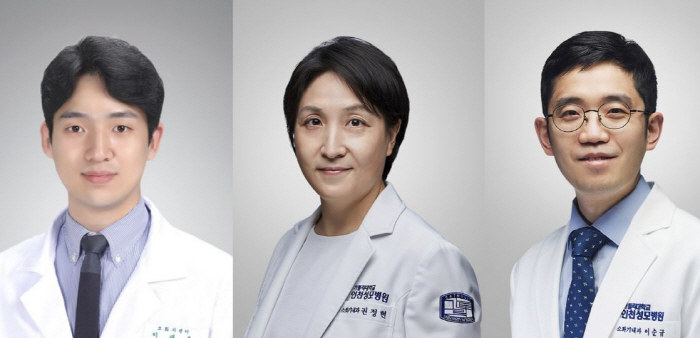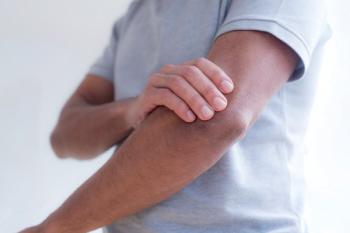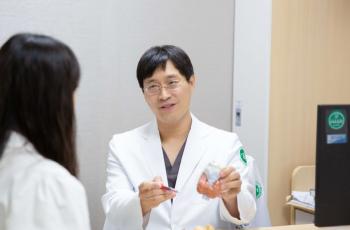The World's First Hepatocellular Cancer Patients with Hepatocellular Cancer to Confirm the Effectiveness of Immuno-An
Jul 22, 2025
Domestic researchers have found for the first time in the world that immuno-cancer drugs atetzolizumab plus bevacizumab (Ate/Bev) can be effective in patients with 7 Child-Pugh Score (CPS7) with some liver function decline among hepatocellular carcinoma patients.
Professor Lee Jae-joon of the Department of Gastroenterology (first author) at Eunpyeong St. Mary's Hospital of Catholic University (Hospital Director Bae Si-hyun), Professor Kwon Jung-hyun and Professor Lee Soon-kyu (corresponding author) of the Department of Gastroenterology at Incheon St. Mary's Hospital conducted a retrospective multicenter study on hepatocellular carcinoma patients treated with Ate/Bevacizumab on 7 points of CPS among hepatocellular carcinoma patients (Subset of Child-Pugh Score 7 Shows Compatible Survival Outcomes to Child-Pugh Score 6 in Patients with Hepatocellular Carcinoma Treated with Atezolizumab and Bevacizumab)' based on data from seven university hospitals in Korea.
Ate/Bev has dramatically improved survival rates in patients with advanced hepatocellular carcinoma and is currently the first-line standard treatment worldwide, but existing clinical trials are limited to CPS 5 or CPS 6 patients with sufficiently preserved liver function, so clinical evidence for CPS 7 patients was insufficient. As a result, CPS7 patients with relatively decreased liver function were placed in a blind spot with limited range of treatment options.
Accordingly, the research team conducted a study on 374 hepatocellular carcinoma patients who received Ate/Bev treatment, and the subjects consisted of 169 CPS 5 patients, 105 CPS 6 patients, and 100 CPS 7 patients. In particular, precise prognostic analysis was intensively conducted on the CPS 7 patient group, which was excluded from previous studies.
Studies have shown that among CPS 7 patients, total bilirubin levels are less than 2 mg/dL, serum albumin levels are between 2.8 and 3.5 g/dL, mild to a degree that can be controlled with diuretics even with ascites, and no hepatic encephalopathy, they have similar survival rates and progression-free survival periods to the CPS 6 patient group. Accordingly, the research team defined the patient group with such favorable conditions as 'favourable CPS 7' and classified patients who did not meet other conditions as 'unfavourable CPS 7'.
As a result of the analysis based on this classification, there was no significant difference in overall survival (OS) and progression-free survival (PFS) between the CPS 6 group and the poor prognosis group showed statistically significant inferiority in all survival indicators. Treatment response rate (ORR) and disease control rate (DCR) were also higher in the prognostic good group, supporting the effectiveness of Ate/Bev treatment in the selected CPS7 patient group.
This study is meaningful in that it presents the possibility of applying a customized treatment strategy by classifying patients more precisely based on detailed indicators of liver function, breaking away from the existing practice of excluding immune anticancer drug treatment only because of CPS 7 in the treatment of patients with hepatocellular cancer. In particular, by suggesting the possibility of expanding the indication of Ate/Bev treatment, it is expected to be of practical help in establishing treatment strategies in the clinical field in the future.
Professor Lee Jae-jun explained, "Previously, the use of immuno-oncology drugs was restricted just because the Child-Pugh Score was 7 points, but this study showed that patients with treatment potential and survival benefits can be selected by closely analyzing the components of liver function."."
Professor Kwon Jeong-hyun emphasized that the study presented an important turning point in the paradigm of liver cancer treatment in that it accurately classified prognosis by reflecting heterogeneity within the CPS 7 patient group and presented customized treatment strategies.
Professor Lee Soon-gyu added, "'In the sense that practical clinical evidence was presented based on domestic multi-center data for CPS 7 patients who have lacked evidence, it will be able to contribute to future guideline revision.'"
Meanwhile, the results of this study were published in the world-renowned international journal Clinical Cancer Research (IF 10.2) published by the American Cancer Research Association (AACR), attracting high international attention.
Professor Lee Jae-joon of the Department of Gastroenterology (first author) at Eunpyeong St. Mary's Hospital of Catholic University (Hospital Director Bae Si-hyun), Professor Kwon Jung-hyun and Professor Lee Soon-kyu (corresponding author) of the Department of Gastroenterology at Incheon St. Mary's Hospital conducted a retrospective multicenter study on hepatocellular carcinoma patients treated with Ate/Bevacizumab on 7 points of CPS among hepatocellular carcinoma patients (Subset of Child-Pugh Score 7 Shows Compatible Survival Outcomes to Child-Pugh Score 6 in Patients with Hepatocellular Carcinoma Treated with Atezolizumab and Bevacizumab)' based on data from seven university hospitals in Korea.
Ate/Bev has dramatically improved survival rates in patients with advanced hepatocellular carcinoma and is currently the first-line standard treatment worldwide, but existing clinical trials are limited to CPS 5 or CPS 6 patients with sufficiently preserved liver function, so clinical evidence for CPS 7 patients was insufficient. As a result, CPS7 patients with relatively decreased liver function were placed in a blind spot with limited range of treatment options.
Accordingly, the research team conducted a study on 374 hepatocellular carcinoma patients who received Ate/Bev treatment, and the subjects consisted of 169 CPS 5 patients, 105 CPS 6 patients, and 100 CPS 7 patients. In particular, precise prognostic analysis was intensively conducted on the CPS 7 patient group, which was excluded from previous studies.
Studies have shown that among CPS 7 patients, total bilirubin levels are less than 2 mg/dL, serum albumin levels are between 2.8 and 3.5 g/dL, mild to a degree that can be controlled with diuretics even with ascites, and no hepatic encephalopathy, they have similar survival rates and progression-free survival periods to the CPS 6 patient group. Accordingly, the research team defined the patient group with such favorable conditions as 'favourable CPS 7' and classified patients who did not meet other conditions as 'unfavourable CPS 7'.
As a result of the analysis based on this classification, there was no significant difference in overall survival (OS) and progression-free survival (PFS) between the CPS 6 group and the poor prognosis group showed statistically significant inferiority in all survival indicators. Treatment response rate (ORR) and disease control rate (DCR) were also higher in the prognostic good group, supporting the effectiveness of Ate/Bev treatment in the selected CPS7 patient group.
This study is meaningful in that it presents the possibility of applying a customized treatment strategy by classifying patients more precisely based on detailed indicators of liver function, breaking away from the existing practice of excluding immune anticancer drug treatment only because of CPS 7 in the treatment of patients with hepatocellular cancer. In particular, by suggesting the possibility of expanding the indication of Ate/Bev treatment, it is expected to be of practical help in establishing treatment strategies in the clinical field in the future.
Professor Lee Jae-jun explained, "Previously, the use of immuno-oncology drugs was restricted just because the Child-Pugh Score was 7 points, but this study showed that patients with treatment potential and survival benefits can be selected by closely analyzing the components of liver function."."
Professor Kwon Jeong-hyun emphasized that the study presented an important turning point in the paradigm of liver cancer treatment in that it accurately classified prognosis by reflecting heterogeneity within the CPS 7 patient group and presented customized treatment strategies.
Professor Lee Soon-gyu added, "'In the sense that practical clinical evidence was presented based on domestic multi-center data for CPS 7 patients who have lacked evidence, it will be able to contribute to future guideline revision.'"
Meanwhile, the results of this study were published in the world-renowned international journal Clinical Cancer Research (IF 10.2) published by the American Cancer Research Association (AACR), attracting high international attention.
|
This article was translated by Naver AI translator.














